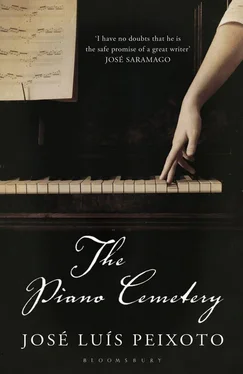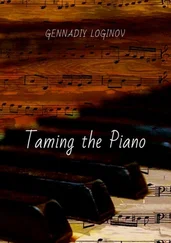during or after dinner. Simão lived on odd jobs, and when he got home he’d go straight to his room. My father followed him with his gaze, as though he was angry with him and waiting for some gesture to fight with him, or at the same time as though he wanted to see if he really could cross the kitchen in silence without looking at anyone. Simão crossed the kitchen in silence, without looking at anyone. When he had gone through and closed the door, my father said, ‘There’s something wrong with that boy.’ I slept in the same room as Simão, and when I went in his eyes were the only points that shone in the darkness. His voice was calm and soft. It was my brother’s voice. He asked me, ‘Is there anything left to eat in the kitchen?’ I didn’t have to answer. I would go back, and if my father had gone to sleep I’d ask my mother for food for Simão. The oil lamp transformed my mother’s movements into shadows. I waited a moment and she put a tray into my hands with a full meal, covered with napkins. If my father was still awake it would just be me discreetly palming a hunk of bread and something to go with it.
not even impossible. Truth — like silence — exists only where I am not. Silence exists behind the words that awake inside me, which fight and destroy themselves and in that struggle gashes of blood open within me. When I think, silence exists outside what I’m thinking. When I stop thinking and focus, for example, on the ruins of a house, there is a wind that unsettles the abandoned stones there, there’s a wind bringing distant sounds and then the silence exists in my thoughts. Untouched and untouchable. When I return to my thoughts, silence returns to that dead house. It is also there — in that absence of me — that truth exists.
hand in hand. For the first time, we walked in silence the whole way. She didn’t tell me tales from the hospital. It was as if that day no one had broken a leg, or died, or gone mad. I didn’t ask her any questions, but I missed her voice on every street. It was as though the streets themselves — the houses, the people passing us — were different without her voice. Only our steps, steps, steps. When we reached the door to her house she looked at me with her eyes covered in shadow. She asked me, ‘Do you still like me?’ I made as if to reply with a kiss, but she moved away and asked me again: ‘Do you still like me?’ I waited, as though I didn’t know what to say because I had nothing to say, and when I brought my lips towards hers she didn’t move away. That was the night we walked across the city hand in hand, arrived at the workshop, went into the piano cemetery and made love for the first time. We didn’t go into her house because of her godmother. We didn’t go into mine, because in spite of the solitude it was still too much my father’s house, my mother’s, my brother’s and sisters’. It always will be. We went into the piano cemetery. Then, wordless, we crossed the city again, the day being born slowly behind us. Lisbon — the streets
was enormous beyond the curtains — the size of the world. When Hermes finished breast-feeding, Marta leaned him over her shoulder and began to pat him gently on the back with the tips of her fingers. Neither my mother, nor Maria, nor Elisa, nor Ana said a word. In this silence of gentle taps on Hermes’s back, it was Marta who asked after Simão.
is six years older than me, but sometimes it’s as though we were the same age. Other times it’s as though I were his older brother. It was two days before I was going to make the trip that would bring me here. I wanted to say goodbye to him. After leaving the workshop I ran to Rossio, and then hung off an electric tram as far as the house where Simão rented a room. I went up the wooden stairs — the sound of my weight on each step. I knocked on the door — broad, uncertain rumblings approaching. The door was opened by a woman with grease stains around her mouth, with dark eyes. I asked her for my brother. She said she didn’t know him. I explained to her that my brother rented a room there. She said again that she didn’t know him. Suddenly, without anyone having called her, just her head appearing at the top of the spiral staircase, the upstairs neighbour said that Simão had gone away and no longer lived in that house. Then she answered no to all the questions I asked her. Thinking about my brother, imagining him, fearful, I ran back home. It was night-time when I went up my sister Maria’s street. I looked in the windows — shadows pointing fingers, shapes that were perhaps too close, and perhaps too abrupt. I don’t know if I could make out my sister’s voice or her husband’s voice shouting
Kilometre eight
were longer when I returned home after meeting her. If I had thought about it occasionally, I might have understood right then that it wasn’t just my will that led me to go and meet her, to desire her; it was also my lack of will, my indecision. Even when she was silent, I looked at her face and I could hear her voice. The velvet, appeasing, comfortable, sincere, living sound of her voice found ways of getting into the inside of my time, into my own inside. As it did, the body of that voice found the huge space of a person who was completely empty — a past covered in doubts, a vague present, a future that did not yet exist. And what little there was seemed like nothing to me — kilometres and minutes — legs trying to destroy the world in a way my arms couldn’t. That was why her voice grew within
the house of the piano-tuner. I was carrying the parts I needed in the toolbox. Each of my steps made the noise of those parts and the tools rattling within the wooden box — a muffled sound which I sometimes imagined being the sound of my heart beating. The morning cleaned the city — even the rubbish abandoned in the crevices of the streets, even the weeds growing at the foot of the walls, even the stones scattered in the earth. When I knocked it was the lady who opened the door for me. Her smile didn’t hide any bad thoughts. I smiled at her, and followed her along the corridor. I looked at each of the rooms as they passed us, because I was looking for her. I would have been satisfied with a piece of her clothing spread out on the back of a chair, the leaf of a plant still moving after her passing, but I found only the empty spaces where at certain moments she might have been, where her face — brought by a miracle — might materialise. We reached the hall. I went to the piano. Alone, I placed my hand on the varnish of the piano and it was as though we were speaking, as though we were the same age and looking at the world from afar. I opened the piano up, and the tools in my hands were as though turning over the mechanism of the morning, as though they understood it and were capable of repairing it. The morning, indifferent, continued to pass, and when the lady came in, leading the tuner by the arm, I almost believed that I wouldn’t ever see her again. I had seen her face the previous day, and I wouldn’t ever see it again. And at the same time as I felt something icy and burning, like hurt, I felt ridiculous because she wouldn’t even be aware of my insignificance, because she existed in a place to which I would never have access, unaware of me, just unaware of me. I said something, because I knew in that way the tuner would be able to follow the sound of my words, would be able to take hold of the thread of my words and come to me. The lady replied, and went out. When we were alone, the tuner, blind since birth — a blind baby — asked me, ‘What’s up with you?’ I replied, ‘Nothing.’ I was only able to deceive him because at that moment she came into the hall. I was the one who said to the tuner: ‘It’s the lady’s granddaughter.’ Turning his head in any old direction, the tuner smiled and was polite. Then he began to touch each of the keys and press on the piano strings. Her chin was right down on her neck, but she raised her eyes to see me. My gaze was fixed inside her eyes. There weren’t three steps separating our bodies. She and I didn’t breathe. At each note the tuner felt the strings vibrate with the tips of his fingers. The whole mechanism — springs, straps, levers — not existing between one extremity and the other — the key and the string — the sound. The notes rose up like pillars across the whole hall. And the fragile moments when the tuner fixed his little silver key and tightened or loosened the strings — the tip of the silver key — broken glass played on by the wind — and the strings stretching — silent groans passing through the air like a thread of breeze. In our linked gaze, another time was passing, another time through which those notes and that silence also passed. The tuner put his silver key away in his jacket pocket, moved away and
Читать дальше












